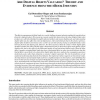Free Online Productivity Tools
i2Speak
i2Symbol
i2OCR
iTex2Img
iWeb2Print
iWeb2Shot
i2Type
iPdf2Split
iPdf2Merge
i2Bopomofo
i2Arabic
i2Style
i2Image
i2PDF
iLatex2Rtf
Sci2ools
104
click to vote
ICIS
2004
2004
Are Digital Rights Valuable? Theory and Evidence from the eBook Industry
The effective management of digital rights is a crucial challenge in many industries making the transition from physical to digital products. We present an economic model that characterizes the value of digital rights when products are sold both embedded in tangible physical artifacts and as pure digital goods, and when granting digital rights may also affect the extent of digital piracy. Our model indicates that in the absence of piracy, digital rights should be unrestricted, since a seller can use their pricing strategy to optimally balance sales between physical and digital goods. However, the threat of piracy limits the extent to which digital rights should be granted: the value of digital rights is determined not only by their direct effect on the quality of legal digital goods, but by their effect on the differential quality of legal and pirated digital goods. When the latter effect is negative, granting digital rights may have a detrimental effect on value; our model indicates ...
| Added | 31 Oct 2010 |
| Updated | 31 Oct 2010 |
| Type | Conference |
| Year | 2004 |
| Where | ICIS |
| Authors | Gal Oestreicher-Singer, Arun Sundararajan |
Comments (0)

